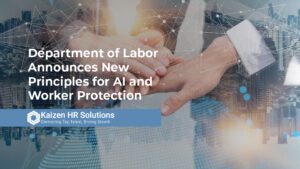The Class of 2023 is officially headed into the workforce! As with every year’s graduating class, the entry of this enthusiastic group of young professionals necessitates further evaluation of their preferences. How can your team effectively attract – and leverage the skills of – this bright new class of graduates?
Balance Boundaries and Responsibility
One topic that has generated many client conversations is “quiet quitting.” This phenomenon is mainly driven (though not exclusively by any means) by younger workers and describes an approach to work focused on doing precisely what one was hired to do – no more and no less. Driven by the pandemic-era reshuffling of people’s priorities and a desire to avoid burnout, quiet quitting is an understandable response to the stresses of this time, but it’s also not the only way to handle things.
Recruiting teams looking to attract new grads in 2023 should highlight professional development opportunities, prioritize viversity and inclusion, and offer some form of flexibility while also creating meaning and purpose in work itself.
Today’s graduates have spent most of their college careers under the shadow of uncertainty, shaping their views on work. They’re more likely than previous generations to ask for what they want and to set clear boundaries on what they will and won’t do. It’s essential to have clarity in your workplace culture about expectations, and you’re much more likely to build a loyal, dedicated workforce when you have a culture that helps them pursue their interests and develop their careers.
Building a Pipeline for Tomorrow
In 2021, a LinkedIn study found that job transitions among Gen Z were up 80% year-over-year. The younger generation of professionals is more willing to be up-front about what they want in a job, and they’re more willing to look for a new role if their current role or company isn’t aligned with their goals and values (including DEI concerns). However, they’re also interested in stability: the Wall Street Journal cites a recent survey that found that 84% of graduating seniors said job stability would make them more likely to apply for a job, up from 73% the previous year.
Because of this, it’s important to consider retention efforts as well as front-line recruiting. Your team should be able to answer questions such as:
- What do career paths look like at this company?
- What opportunities for career development or mentorship are offered?
- How does the company support ongoing education and upskilling?
- How do you handle employee appreciation and recognition?
These retention efforts aren’t just helpful for new grads – they can significantly impact your team across the board.
Navigating Uncertainty in the Workforce
Many new grads face a conundrum, as some sectors are rapidly cooling while others continue to grow. In particular, we have seen declines in job openings in knowledge-worker fields, such as software, software, financial services, and biotech. Opportunities for new grads are aligned with general trends for today’s workforce, where many service-oriented and public-facing fields are still struggling to fill jobs while higher-paying, fast-growing fields are trimming budgets to course-correct after a couple of years of rapid, even explosive growth.
As a result, new grads are looking for jobs that they believe can help them weather a period of economic uncertainty. Consider the following stats on Class of 2023 sentiments, as reported by the Wall Street Journal:
- 76% believe they can find a well-paying job.
- 40% are open to industries or roles they had previously yet to consider.
- 84% say that “stability” is a factor that will make them more likely to accept a job, followed by salary (82%) and benefits (81%).
Ultimately, companies looking to hire from the Class of 2023 should understand that the latest grads seek balance and stability. They’re interested in jobs that provide a sense of purpose and align with their values, but they’re also practical and searching for stable footing as the world grows more uncertain. They can be a powerful and lasting force for bringing your company into the future, and their potential can be limitless in the proper context.
By Rose Dorta

Are you a high-performing leader or believe you have the potential to tackle a more challenging role? Would you be interested in career opportunities that are seeking these attributes?
I’d love to chat with you and answer any questions that you have. Email me, Rose Dorta, Managing Director of Kaizen HR Solutions, here.







